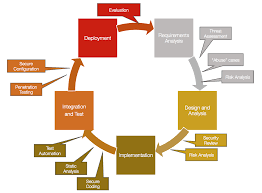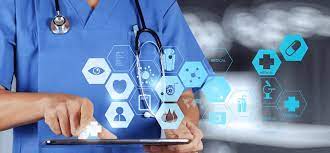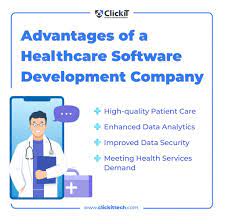Advancing Healthcare Through Innovative Medical Software Development
The Importance of Medical Software Development in Healthcare
Medical software development plays a crucial role in modern healthcare systems, revolutionizing the way medical professionals manage patient data, streamline processes, and improve overall patient care. With advancements in technology, the development of specialized software tailored to the healthcare industry has become essential for efficient and effective healthcare delivery.
Enhancing Patient Care
Medical software applications enable healthcare providers to access and analyze patient information quickly and accurately. Electronic Health Records (EHR) systems, for example, centralize patient data, making it easily accessible to authorized personnel across different departments and locations. This streamlined access to patient information enhances collaboration among healthcare teams, leading to better-coordinated care and improved patient outcomes.
Improving Efficiency and Accuracy
By automating routine tasks such as appointment scheduling, billing processes, and prescription management, medical software helps reduce administrative burdens on healthcare staff. This automation not only improves efficiency but also minimizes the risk of errors that can occur with manual data entry. Additionally, decision support tools integrated into medical software assist clinicians in making informed treatment decisions based on evidence-based guidelines and real-time data.
Ensuring Data Security and Compliance
Medical software developers prioritize data security and compliance with regulations such as HIPAA (Health Insurance Portability and Accountability Act) to safeguard sensitive patient information. Encryption protocols, user authentication mechanisms, and regular security audits are implemented to protect against unauthorized access or data breaches. Compliance with regulatory requirements ensures that patient confidentiality is maintained at all times.
Facilitating Telemedicine and Remote Care
In recent years, the development of telemedicine platforms has expanded access to healthcare services beyond traditional clinical settings. Through secure video conferencing tools and remote monitoring capabilities integrated into medical software applications, patients can consult with healthcare providers remotely for diagnosis, treatment recommendations, and ongoing care management. This advancement in telehealth technology has proven particularly valuable during public health crises when in-person visits may not be feasible.
The Future of Medical Software Development
As technology continues to evolve rapidly, the future of medical software development holds immense potential for further innovation in healthcare delivery. Artificial intelligence (AI), machine learning algorithms, Internet of Things (IoT) devices, and blockchain technology are among the emerging technologies expected to shape the next generation of medical software solutions. These advancements aim to enhance personalized medicine approaches, optimize clinical workflows, and empower patients to take a more active role in managing their health.
In conclusion, medical software development is driving positive transformation within the healthcare industry by improving patient care quality, operational efficiency, data security measures…
Frequently Asked Questions About Medical Software Development: A Comprehensive Guide
- What software is used in healthcare industry?
- What does a healthcare software developer do?
- What type of software is used in healthcare?
- How to develop medical software?
- What are the examples of medical software?
- What does a medical software developer do?
- How to create a medical software?
- How to become a medical software engineer?
What software is used in healthcare industry?
In the healthcare industry, a variety of software applications are utilized to streamline operations, enhance patient care, and improve overall efficiency. Common types of software used in healthcare include Electronic Health Records (EHR) systems for managing patient data, Practice Management Software for scheduling appointments and billing, Picture Archiving and Communication Systems (PACS) for storing and sharing medical images, Telemedicine platforms for remote consultations, and Clinical Decision Support Systems to aid healthcare providers in making informed treatment decisions. These software solutions play a vital role in modern healthcare delivery by facilitating communication among healthcare professionals, ensuring accurate record-keeping, and supporting evidence-based clinical practices.
What does a healthcare software developer do?
A healthcare software developer specializes in designing, creating, and maintaining software applications tailored to the unique needs of the healthcare industry. These professionals collaborate with healthcare providers, IT experts, and other stakeholders to develop innovative solutions that streamline processes, enhance patient care, and improve overall efficiency within healthcare settings. Healthcare software developers are responsible for coding, testing, and implementing software systems such as Electronic Health Records (EHR), telemedicine platforms, medical imaging software, and clinical decision support tools. They ensure that these applications comply with industry regulations, prioritize data security, and integrate seamlessly into existing healthcare workflows to meet the evolving demands of modern healthcare delivery.
What type of software is used in healthcare?
In healthcare, a variety of software applications are utilized to support different aspects of medical practice and patient care. Electronic Health Records (EHR) systems are commonly used to store and manage patient information, treatment plans, and medical histories in a digital format accessible to healthcare providers. Practice Management Software helps streamline administrative tasks such as appointment scheduling, billing, and insurance claims processing. Clinical Decision Support Systems (CDSS) provide clinicians with evidence-based guidelines and real-time data analysis to assist in making informed treatment decisions. Telemedicine platforms enable remote consultations and monitoring of patients through secure video conferencing tools. Overall, the software used in healthcare encompasses a wide range of functionalities designed to enhance efficiency, accuracy, and quality of care delivery.
How to develop medical software?
Developing medical software requires a strategic approach that prioritizes regulatory compliance, data security, and user experience tailored to the healthcare industry’s unique needs. The process typically involves thorough research to understand the specific requirements of healthcare professionals and patients, followed by designing a user-friendly interface and robust functionality that supports clinical workflows. Collaboration with medical experts, adherence to industry standards such as HL7 and DICOM, rigorous testing for accuracy and reliability, and ongoing maintenance to ensure compliance with evolving regulations are essential steps in the development of effective medical software solutions.
What are the examples of medical software?
Medical software encompasses a wide range of applications designed to support various aspects of healthcare delivery. Examples of medical software include Electronic Health Records (EHR) systems, which centralize patient data for easy access and management by healthcare providers. Picture Archiving and Communication Systems (PACS) facilitate the storage and retrieval of medical images such as X-rays and MRIs. Practice Management Software helps healthcare facilities streamline administrative tasks like billing and scheduling. Telemedicine platforms enable remote consultations between patients and healthcare professionals. Clinical Decision Support Systems (CDSS) provide evidence-based recommendations to aid clinicians in treatment decisions. These examples highlight the diverse functionalities of medical software in enhancing patient care, operational efficiency, and overall healthcare outcomes.
What does a medical software developer do?
A medical software developer is responsible for designing, creating, and maintaining software applications specifically tailored to the healthcare industry. These professionals collaborate with healthcare providers, IT specialists, and other stakeholders to understand the unique requirements of medical settings and develop solutions that address those needs. Medical software developers utilize their expertise in programming languages, database management, and healthcare regulations to build user-friendly applications that streamline processes, improve patient care delivery, ensure data security and compliance, and facilitate innovations such as telemedicine and electronic health records systems. Their role is pivotal in advancing the use of technology to enhance healthcare services and optimize clinical workflows for better patient outcomes.
How to create a medical software?
Creating medical software involves a systematic approach that begins with identifying the specific needs and requirements of healthcare professionals and patients. The first step is to conduct thorough research to understand the workflow processes, data management protocols, and regulatory standards relevant to the healthcare domain. Collaborating with medical experts and IT professionals is essential in designing a user-friendly interface, implementing robust security measures, and integrating features such as electronic health records (EHR), telemedicine capabilities, and decision support tools. Developing a scalable architecture, rigorous testing procedures, and continuous updates are critical to ensuring the software’s reliability, performance, and compliance with industry regulations. Effective communication, feedback loops, and user training programs are key elements in successfully deploying and maintaining a medical software solution that meets the evolving needs of healthcare providers and enhances patient care outcomes.
How to become a medical software engineer?
To become a medical software engineer, individuals typically pursue a relevant educational background in computer science, software engineering, or a related field. Acquiring knowledge of programming languages commonly used in healthcare technology, such as Python, Java, or C++, is essential. Gaining experience through internships or projects in the healthcare industry can provide valuable insights into the specific requirements and challenges of medical software development. Continuous learning and staying updated on industry trends, regulations, and best practices are crucial for aspiring medical software engineers to excel in this specialized field. Strong problem-solving skills, attention to detail, and a passion for leveraging technology to improve patient care are key attributes for success in this rewarding career path.








